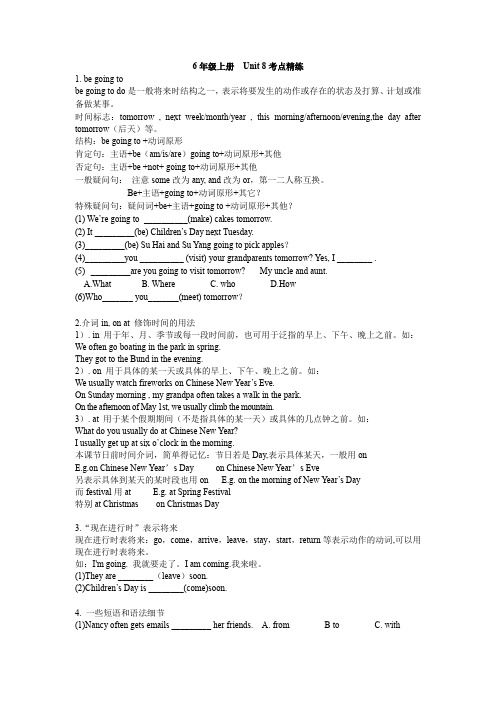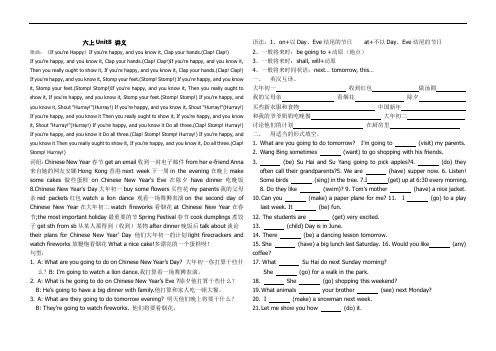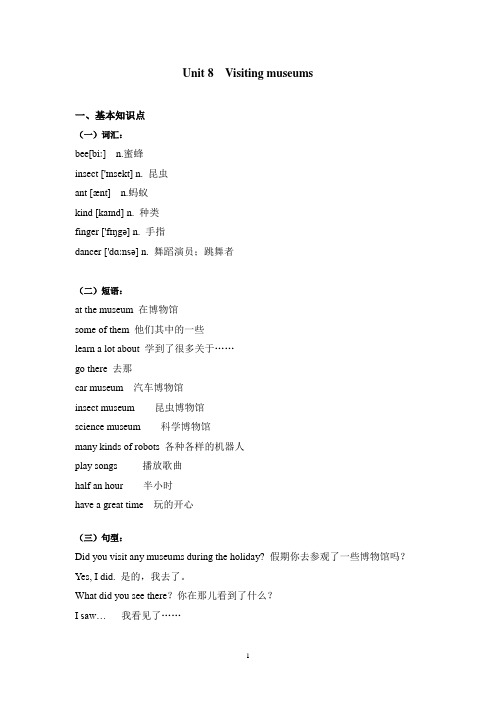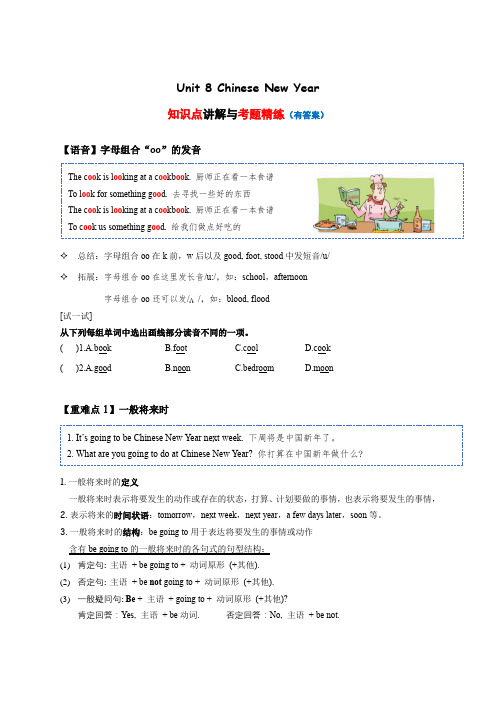2020小学英语六年级上册Unit8知识点及练习题
牛津译林版六年级英语上册第八单元重难点梳理与练习含答案

Unit8Chinese New Year【必背单词】1.get收到2.Hong Kong香港3.next week下周4.food食物,食品5.tangyuan汤圆6.Chinese New Year’s Eve大年夜,除夕7.Chinese New Year’s Day大年初一,春节8.red packet红包9.lion dance舞狮10.fireworks烟花表演11.firecracker鞭炮12.rich富有的,有钱的13.plan计划,打算14.hooray好极了15.light点燃16.second第二17.cookbook菜谱18.most最多19.Spring Festival春节20.tomorrow明天21.Thanksgiving感恩节22.also也23.e-friend网友24.important重要的【必背词组】1.Chinese New Year=Spring Festival春节2.get sth from sb从某人那里收到/得到某物3.in Hong Kong在香港4.next week下一周(反)last week5.in the evening/afternoon在晚上/下午6.have dinner吃晚饭7.my parents我的父母亲8.the most important holiday最重要的节日9.Spring Festival春节10.cook dumplings煮饺子11.give sb.sth.=give sth.to sb.把某物给某人12.after dinner晚饭后13.talk about谈论14.a nice cake漂亮的蛋糕15.at Chinese New Year在新年16.on Chinese New Year’s Eve在除夕17.on Chinese New Year’s Day在年初一18.buy some new clothes and food买一些新衣服和食物19.make some cakes and tangyuan做些蛋糕和汤圆20.watch fireworks看烟火21.watch a lion dance看舞狮22.have a big dinner吃顿大餐23.on the second day of Chinese New Year在年初二24.the most important holiday in the UK在英国最重要的节日25.the most important festival in China在中国最重要的节日26.talk about谈论27.plan for sth为某事作计划/打算27.light some firecrackers and fireworks点燃一些爆竹和烟火28.say“Happy New Year”to…对…说新年好29.have a lot of fun玩得愉快30.in the kitchen在厨房【语法】一、be going tobe going to do是一般将来时结构之一,表示将要发生的动作或存在的状态及打算、计划或准备做某事。
苏教版六年级英语上册Unit8 重点整理

Unit 8 Chinese New Year一、单词1.get收到,接到2.food 食物,食品3.rich富有的,有钱的4.plan计划,打算5.Hong Kong 香港6.tangyuan 汤圆7.firecracker鞭炮8.rich 富有的,有钱的9.plan计划,打算10.light 点燃11.festival节日12 fireworks 烟花表演13 important 重要的14 packet 包二、词组1.Chinese New Year春节2.get an email from her e-friend收到来自她网友的邮件3.in Hong Kong在香港4.next week下周5.be very excited很激动6.buy some new clothes and food买一些新衣和食物7.in the evening在晚上8.make some cakes做蛋糕9.on Chinese New Year’s Eve在大年夜,除夕10. have dinner吃晚饭11.buy some flowers 买些花12.on Chinese New Year’s Day在大年初一这一天13.give me red packets给我红包14.watch a lion dance观看舞狮15.in the afternoon在下午16.on the second day of Chinese New Year在春节的第二天17.watch fireworks看烟花表演18.in the evening 在晚上19.at Chinese New Year在春节期间20.the most important holiday 最重要的节日21.Spring Festival春节22.in the US 在美国23. in the kitchen在厨房24. cook dumplings 煮饺子25. get red packets得到红包26. after dinner晚饭后27.have a red packet 有一个红包28.talk about谈论29. plan for…….的计划30.plan for…………计划31. What a nice cake! 多么好的蛋糕哇!32.eat dumplings吃饺子33. firecrackers and fireworks 鞭炮和烟花34.Happy Chinese New Year 新年快乐35.buy a lot of things 买许多东西36.get your email收到你的邮件37. light some firecrackers and fireworks 放一些鞭炮和烟花四、句子1.Chinese New Year is coming.春节就要到了。
六年级英语上册Unit8知识点及练习题_广州版

Unit8知识点及练习题一、课前小测黑板告诉某人做某事tell sthkeep(过去式) by bike = on bike科学晚上有趣的它的.穷的圣诞节有没有.惊讶的无聊的这/这个那/那个.这些那些米饭the answer the questionDo you walk (many/a lot) every day? So my life is very (health/healthy)1. My headache started two days ago. (就划线部分提问)__________ __________ your headache __________?2. She has a toothache. (变成否定句)She __________ __________ a toothache.二、听力训练课堂表现:三、Unit8单词四、Unit8 短语go on a trip, by train, take a photo…五、Unit8 句型1. Ben sat with me until I felt better.2. Ben said he was very excited because it was his first visit to the island.3. We all hope the trees will grow well.六、知识考点1. I went on a trip to Hong Kong. 我去香港旅游了。
辨析:journey, travel, trip的区别1)journey指从一地到另一地,通常指陆地上的远距离“旅行”,有时也可以表示经常走的或长或短的“路程”。
只作名词。
如: I took a journey from Beijing to Shanghai last year.- - How long is your journey to school? -- Only about 10 minutes.2) travel作“旅行、游历”解,一般表示从一地到另一地旅行这一总的概念。
Unit8ChineseNewYear(知识清单)译林版英语六年级上册

Unit 8 Chinese New Year1.I’m very excited. 我很兴奋。
excited “感到兴奋的”;“对…感到兴奋”的短语是____________,一般用来修饰人;修饰物的是_____________;类似的单词还有:interesting/interested; boring/bored等等。
【例题精讲】例1.This movie is very exciting.这部电影很让人兴奋。
例2.He is excited about the ing holiday.他对即将而来的假期感到很兴奋。
【巩固练习】Lily is very ________ about the ________ news.(excited)2.Chinese New Year is ing.be doing 表将来,常见动词:arrive,go,leave,eEg:The bus is arrivingWhere are you going?They’re going to New York next week. 他们下周将去纽约。
3.Su Hai gets an email from her efriend Anna in Hong Kong.get an email from sb收到来自sb 的邮件an emailan efriendEg:how to write an email4.On Chinese New Year’s Eve,we’re going to have dinner withmy grandparents, my aunt and uncle and my cousin.on Chinese New Year’s Day.介词in, on at 修饰时间的用法①in 用于年、月、季节或每一段时间前,也可用于泛指的早上、下午、晚上之前。
Eg:例1. We often go boating in the park in spring.春天我们经常在公园划船。
六年级上册英语单元基础知识默写+重难点突破+综合能力提升练-Unit 8 译林版

译林版六年级上册Unit 8 Chinese New Year第一部分基础知识过关一、重点单词。
(英汉互译)1. 收到,接到_____________2. 食物,食品____________3. 鞭炮_______________4. 烟花表演______________5. 点燃_________________6. 计划,打算_________7. 富有的,有钱的________ 8.tangyuan_______________ 9.hooray______________二、看图写词语。
1. 2. 3. 4.________________ _________________ _______________ _________________三、重点短语。
(英汉互译)1. 在春节____________________________2. 在除夕___________________________3. 在大年初一________________________4. 下周_____________________ ________5. 和……吃晚饭______________________6. 买一些花_________________________7. 收到红包__________________________8.观看一场舞狮表演__________________9. 观看烟花表演______________________ 10.谈论他们的计划____________________ 11. 最重要的节日_____________________ 12. before Chinese New Year_____________ 13. get … from…______________________ 14. in Hong Kong______________________15. light some firecrackers and fireworks ______________________________________________16. buy some new clothes and food ___________________________________________________17. make some cakes and tangyuan ___________________________________________________四、重点句子。
译林苏教版六上Unit8语法知识点+课堂练习+课后练习

Unit Eight【语法】一、be going tobe going to do是一般将来时结构之一,表示将要发生的动作或存在的状态及打算、计划或准备做某事。
把be going to后面跟动词原形,句中一般有以下时间状语:tomorrow, next day(week, month, year…), soon(不久), tomorrow morning等。
本单元学习be going to…结构的特殊疑问句及肯定句。
如:We are going to have a party next Monday. 下星期一我们将开联欢会。
I’m going to see my grandparents this week. 这个星期我打算去看我的祖父母。
Is he going to play football tomorrow? 明天他要去踢足球吗?Who is she going to play with? 她打算跟谁一起玩?总结学过的疑问词,由疑问词引申出特殊疑问句,用多种方式训练表达。
例如:Mike is going to play football with Liu Tao tomorrow.What is going to do with Liu Tao tomorrow?Who is going to play football with Liu Tao tomorrow?When is Mike going to play football with Liu Tao?Who is Mike going to play football with tomorrow?[课堂练习]I. 用所给动词的适当形式填空。
1. Jim and Li Lei _______________ (watch) the football match this evening.2. _________ she __________(have) a Chinese lesson tomorrow?3. — What ________ you ____________ (do) tomorrow morning?— I __________________ (see) my grandparents.4. __________ they ____________ (go) fishing this Friday afternoon?5. There __________________ (be) a birthday party this evening.II. 按要求改写句子。
Unit 8 重难知识点(复习讲义)六年级英语上册(译林版三起)

Unit 8 Chinese New Year重难点讲解(含答案)一、重难点讲解1.Chinese New Year is coming. 春节就要到了。
解析:句中的be coming 在形式上是现在进行时,但在这里表示的是即将发生的事情。
在英语中,表示位置转移的go,come,leave等动词的现在进行时,常用于表达按计划或安排即将发生的动作。
【例句】When is he leaving? 他将什么时候动身离开?【练习】根据中文提示完成句子。
儿童节就要到了,孩子们很兴奋。
Children’s Day and the children are very .【答案】is coming, excited2.Su Hai gets an email from her e-friend Anna in Hong Kong.苏海收到一封来自她香港网友安娜的电子邮件。
解析:get意为“收到,接到”,如果要表达“从某人处得到某物”,可以用get sth from sb。
【例句】—What do you usually get on your birthday?你在生日通常收到什么?—I usually get a lot of presents from my parents.我通常从我的父母那里收到很多礼物。
【练习】单项选择。
( ) Helen a concert ticket her brother last night.A. get; forB. got;offC. got;from【答案】C3.It’s going to be Chinese New Year next week. 下个星期将是春节了。
解析:(1)“be going to+动词原形”用来表示按计划或安排要发生的动作,有时也可以表示推测将要或肯定会发生的动作,有“准备,打算”的意思,是一般将来时的一种表达形式。
其中,be动词跟随主语的变化而变化。
译林版六年级英语上册第八单元知识点归类整理(第一学期期末复习资料unit 8重点归纳)

Unit 8 Chinese New Year一、重点词组:1.春节前 before Chinese New Year2.在香港in Hong Kong3.收到她网友的一封电子邮件 get an email from her e-friend4. 下一周next week5.买一些新衣服buy some new clothes6. 在晚上 in the evening7.做些蛋糕和汤圆make some cakes and tangyuan8.在除夕夜 on Chinese New Year’s Eve9.在大年初一 on Chinese New Year’s Day10.和祖父母吃晚饭 have dinner with my grandparents11.给我红包give me red packets12. 观看狮舞表演 watch a lion dance13.在第二天 on the second say14. 看你烟花watch fireworks15. 在春节 at Chinese New Year16. 吃一顿丰盛的晚餐have a big dinner17. 看着一本烹饪书look at a cookbook18. 春节Spring Festival19.寻找一些好东西look for something good20.得到红包 get red packets21.为我们煮好吃的cook us something good22.晚饭后 after dinner23.最重要的节日 the most important holiday24. 有一个红包 have a red packet25.在厨房煮饺子cook dumplings in the kitchen26.多么美味的蛋糕啊! What a nice cake!27.谈论他们的计划talk about their plans28. 打算看望爱丽丝阿姨be going to see Aunt Alice29.给某人写电子邮件 write an email to ...30. 玩得很开心 have a lot of fun31. 燃放烟花爆竹 light some firecrackers and fireworks32. 对他们说新年快乐 say “Happy New Year” to them二、重点句型1. ---大年初一你打算干些什么? ----我打算看一场舞狮表演。
(译林版)六年级上册-Unit-8-考点精练

6年级上册Unit 8考点精练1. be going tobe going to do是一般将来时结构之一,表示将要发生的动作或存在的状态及打算、计划或准备做某事。
时间标志:tomorrow , next week/month/year , this morning/afternoon/evening,the day after tomorrow(后天)等。
结构:be going to +动词原形肯定句:主语+be(am/is/are)going to+动词原形+其他否定句:主语+be +not+ going to+动词原形+其他一般疑问句:注意some改为any, and改为or,第一二人称互换。
Be+主语+going to+动词原形+其它?特殊疑问句:疑问词+be+主语+going to +动词原形+其他?(1) We’re going to__________(make) cakes tomorrow.(2) It _________(be) Children’s Day next Tuesday.(3)_________(be) Su Hai and Su Yang going to pick apples?(4)_________you __________ (visit) your grandparents tomorrow? Yes, I ________ .(5)--_________are you going to visit tomorrow? --My uncle and aunt.A.WhatB. WhereC. whoD.How(6)Who_______ you_______(meet) tomorrow?2.介词in, on at 修饰时间的用法1). in 用于年、月、季节或每一段时间前,也可用于泛指的早上、下午、晚上之前。
如:We often go boating in the park in spring.They got to the Bund in the evening.2). on 用于具体的某一天或具体的早上、下午、晚上之前。
外研版六年级英语上册Module8单词,短语,句子 及练习

六年级英语上册Module8单词,短语,句子一、单词1、long ago 很久以前2、I’ve love to 我很乐意3、not really 不全是,事实上没有4、stop 停止5、clean打扫;(使)清洁6、camera照相机7、show把...给(某人)看8、never 从不二、短语1、long ago 很久以前2、I’d love to 我很乐意3、not really 不全是,事实上没有4、a long time ago 很久以前5、read books 读书6、read stories 读故事7、of course 当然8、take photos 拍照9、show sb. sth. 给某人看某物10、watch films 看电影11、eat fast food 吃快餐12、play table tennis 打乒乓球13、send emails 发送电子邮件14、climb trees 爬树15、go shopping 去购物16、go to the doctor 去看医生17、cook dinner 做晚餐18、do one’s homework 做某人的家庭作业19、go swimming 去游泳20、by bus 乘公交汽车21、clean one’s room打扫房间三、句子1、Do you often play with dolls?2、Do you like reading books now?3、Do you want to see my photos?4、Yes, I’ve love to.5、I sometimes clean the blackboard for my teacher.6、I never play with dolls.7、You’re cleaning your room.8、I often go swimnming.四、语法:现在进行时1、表示现在正在进行或发生的动作。
六年级上册英语知识点及练习题Module 8丨外研版

短语和句型姓名______________一、单词。
stop clean show always often sometimes never camera photo 停止打扫给某人看一直经常有时从不相机照片动词原形 stop take love动词过去式 stopped took loved动词原形 clap have take swim write make run shop动词ing形式 clapping having taking swimming writing making running shopping二、短语。
see my photos看我的相片 long ago 很久以前 I`d love to.(=I would love to..)我想要...play with....玩..... a long time很长时间 a long time ago很久以前 a picture book一本漫画 in this photo在这张相片里 read books看书 of course当然可以 read stories读/看故事 clean one`s room清扫某人的房间Not very often不是很经常 not really不是这样的 look at 看go to see films去看电影 speak English说/讲英语 play computer games 玩电子游戏help your mum帮助你妈妈 eat fast food吃快餐 clean the blackboard擦黑板 fly a kite放风筝make a list of 列一个清单 have a picnic野餐 climb a tree/trees爬树drink tea喝茶visit your grandma拜访你的奶奶 clean the classroom打扫教室 send emails 发送电子邮件take photos of…给某人照相 go to the doctor看病/看医生collect stamps集邮 by bus乘公共汽车三、句型。
Unit8语法(复习讲义)六年级英语上册单元速记巧练(译林版三起)

Unit 8 Chinese New Year语法梳理:一般将来时精讲精练(含答案)❖一般将来时( be going to) 的陈述句1.定义:一般将来时表示将要发生的动作或状态,打算、计划或准备要做的事情,也表示将来可能发生的事情,常与表示将来的时间状语连用。
2.常见的表示将来的时间状语有:tomorrow, next week, next year, soon, in a few days等。
3.“be going to+动词原形”是一般将来时的常见结构,其中be动词要随主语的变化而变化。
表示否定时则在be动词后加not。
例如:I'm(not) going to play football with Mike tomorrow.我明天将要(将不会)和迈克踢足球。
Wang Bing is(not) going to watch a film on Sunday.王兵周日将要(将不会)看电影。
They are(not) going to stay at home this weekend. 这周末他们打算(不打算)待在家里。
✓拓展:有的动词(e,go,leave,arrive等表示位置移动的单词)经常用现在进行时表示将来时,说明将要发生的事。
例如:Chinese New Year is ing.中国农历新年就要到了。
I'm going to Suzhou.我将要去苏州。
When is your father leaving?你父亲打算什么时候动身离开?【考题精练】一、用所给单词的适当形式填空。
1. My brother (go) to Shanghai next week.2. Mary (visit) her grandparents tomorrow.3. David and Tommy (give) a puppet show next Monday.4. I (make) a plan for my study in two days.5. Miss Li (e). Stop (talk)!6. She usually (watch) TV at weekends, but next Saturday she (play) football.二、按要求完成句子。
[全]鲁教版英语六年级上册Unit 8知识要点汇总
![[全]鲁教版英语六年级上册Unit 8知识要点汇总](https://img.taocdn.com/s3/m/53c01ba2ddccda38366bafa0.png)
鲁教版英语六年级上册Unit 8知识要点汇总当主语是第一人称(I,we),第二人称(you),第三人称复数(they,复数名词,多个人名等)时,用have。
·当主语是第三人称单数(he,she,it,Tom,the dog等)时,用has。
注意:1. have是has的原形,has是have的第三人称单数形式。
2. 主语第三人称单数也可以归纳为"非你,非我,非复数"。
养成一个习惯:遇到动词先看主语2. He often __________(have) dinner at home.3. Lucy _____ (have) a bat.4. My cousins_______(have) two tennis ball.5. Bob and Mike _________ (have) a desk.6. your parents _______(read) newspapers every day.·陈述句(肯定句):分为两种:有be动词和没有be动词。
1 主语+ be+ 其他2 主语+行为动词+其他必须注意:不能出现主语+be+行为动词+其他 Be动词不能和其他动词同在一个句子中出现。
·变否定句的规则:1 有be动词时,直接在be动词后加not。
2 没有be动词时,在主语之后(动词之前)加don't或doesn't:当主语是第三人称单数时,在动词的前面加doesn't. 后面的动词要还原;其他主语用don't。
7. I ________ (not have) a pen.8. Jim ______________ (not have ) a pen.9. We __________(not watch) TV on Monday.10. Nick _________(not go) to the zoo on Sunday.11. My cousins_______(not have) two tennis ball.12. He likes salad, but he ____ hamburgers.A. don't likeB. likesC. doesn't like·变一般疑问句规则:1 有be动词时,be动词提前。
新牛津译林版英语六年级上册第八单元语法总结与练习

六上Unit8 讲义歌曲:《If you're Happy》If you're happy, and you know it, Clap your hands.(Clap! Clap!)If you're happy, and you know it, Clap your hands.(Clap! Clap!)If you're happy, and you know it, Then you really ought to show it, If you're happy, and you know it, Clap your hands.(Clap! Clap!) If you're happy, and you know it, Stomp your feet.(Stomp! Stomp!) If you're happy, and you know it, Stomp your feet.(Stomp! Stomp!)If you're happy, and you know it, Then you really ought to show it, If you're happy, and you know it, Stomp your feet.(Stomp! Stomp!) If you're happy, and you know it, Shout "Hurray!"(Hurray!) If you're happy, and you know it, Shout "Hurray!"(Hurray!) If you're happy, and you know it Then you really ought to show it, If you're happy, and you know it, Shout "Hurray!"(Hurray!) If you're happy, and you know it Do all three.(Clap! Stomp! Hurray!) If you're happy, and you know it Do all three.(Clap! Stomp! Stomp! Hurray!) If you're happy, and you know it Then you really ought to show it, If you're happy, and you know it, Do all three.(Clap! Stomp! Hurray!)词组:Chinese New Year春节get an email收到一封电子邮件from her e-friend Anna 来自她的网友安娜Hong Kong香港next week下一周in the evening在晚上make some cakes做些蛋糕on Chinese New Year's Eve在除夕have dinner吃晚饭8.Chinese New Year's Day大年初一buy some flowers买些花my parents我的父母亲red packets红包watch a lion dance 观看一场舞狮表演on the second day of Chinese New Year在大年初二watch fireworks看烟花at Chinese New Year在春节;the most important holiday最重要的节Spring Festival春节cook dumplings煮饺子get sth from sb从某人那得到(收到)某物after dinner晚饭后talk about谈论their plans for Chinese New Year’Day 他们大年初一的计划light firecrackers and watch fireworks放鞭炮看烟花What a nice cake!多漂亮的一个蛋糕呀!句型:1.A: What are you going to do on Chinese New Year’s Day? 大年初一你打算干些什么?B: I’m going to watch a lion dance.我打算看一场舞狮表演。
沪教版六年级上册英语Unit8 Visiting museums知识点习题

Unit 8 Visiting museums一、基本知识点(一)词汇:bee[biː]n.蜜蜂insect ['ɪnsekt] n. 昆虫ant [ænt] n.蚂蚁kind [kaɪnd] n. 种类finger ['fɪŋgə] n. 手指dancer ['dɑːnsə] n. 舞蹈演员;跳舞者(二)短语:at the museum 在博物馆some of them 他们其中的一些learn a lot about 学到了很多关于……go there 去那car museum 汽车博物馆insect museum 昆虫博物馆science museum 科学博物馆many kinds of robots 各种各样的机器人play songs 播放歌曲half an hour 半小时have a great time 玩的开心(三)句型:Did you visit any museums during the holiday? 假期你去参观了一些博物馆吗?Yes, I did. 是的,我去了。
What did you see there?你在那儿看到了什么?I saw…我看见了……(四)重难点、易错点:1.What did you see at the museum?I saw a lot of interesting cars.2.butterfly 复数---butterflies3.buy---bought learn--- learnt stand---stood4.anything和something的区别二、典型例题1. Everyone has ten ________.A. fingersB. feetC. hobby【解析】答案:A根据句意:“每个人都有十个________”。
可知答案为A。
手指。
2. -- What does your mother do?---She is a ________.A. danceB. dancingC. dancer【解析】答案:C根据句意:“你的妈妈是做什么的?”“她是一个________”。
六年级上册 U8 知识点总结梳理

六年级上册 U8 知识点总结梳理一、单词和短语1、动词变过去式:go - went,do - did,play - played,eat - ate,wear - wore,buy - bought,arrive - arrived。
2、名词复数形式:book - books,pencil - pencils,pen - pens,desk - desks,chair - chairs,chalk - chalks。
3、形容词比较级:big - bigger,small - smaller,long - longer,short - shorter。
4、数字表达:one - first,two - second,three - third,four - fourth,five - fifth,six - sixth,seven - seventh,eight - eighth,nine - ninth,ten - tenth。
5、时间表达:morning - in the morning,afternoon - in the afternoon,evening - in the evening。
6、其他常用短语:in English在英语中,from…to…从……到……,at the weekend在周末。
二、重点句型1、What did you do last weekend?上周末你做了什么?I went to the park.我去了公园。
2、What did she do yesterday?她昨天做了什么?She played basketball.她打了篮球。
3、What did they do on Sunday?他们星期天做了什么?They read books and watched TV.他们看书和看电视。
4、What did he do on Saturday morning?他星期六早上做了什么?He cleaned his room.他打扫了他的房间。
新标准英语六年级上册八模块知识点及练习题

新标准英语六年级上册八模块知识点及练习题一、单词。
stop clean show always often sometimes never camera photo停止打扫给某人看一直经常有时从不相机照片动词原形stop take love动词过去式 stopped took loved动词原形clap have take swim write make run shop动词ing形式 clapping having taking swimming writing making running shopping二、短语。
see my photos看我的相片long ago 很久以前I`d love to、(=I would loveto、、)我想要、、、play with、、、、玩、、、、、 a long time很长时间 a long time ago很久以前 a picture book一本漫画in this photo在这张相片里read books看书of course当然可以read stories读/看故事clean one`s room清扫某人的房间Not very often不是很经常not really不是这样的look at 看go to see films去看电影speak English说/讲英语help your mum帮助你妈妈eat fast food吃快餐clean the blackboard擦黑板fly akite放风筝make a list of 列一个清单have a picnic野餐climb a tree/trees爬树drink tea喝茶visit your grandma拜访你的奶奶clean the classroom打扫教室sendemails发送电子邮件take photos of…给某人照相go to the doctor看病/看医生collect stamps集邮by bus乘公共汽车三、句型。
小学英语六年级上册知识讲解考点精练Unit 8 Chinese New Year(译林版三起含答案)

Unit 8 Chinese New Year知识点讲解与考题精练(有答案)【语音】字母组合“oo”的发音✧总结:字母组合oo在k前,w后以及good, foot, stood中发短音/u/✧拓展:字母组合oo在这里发长音/u:/,如:school,afternoon字母组合oo还可以发/ʌ/,如:blood, flood[试一试]从下列每组单词中选出画线部分读音不同的一项。
( )1.A.book B.foot C.cool D.cook( )2.A.good B.noon C.bedroom D.moon【重难点1】一般将来时1.一般将来时的定义一般将来时表示将要发生的动作或存在的状态,打算、计划要做的事情,也表示将要发生的事情,2.表示将来的时间状语:tomorrow,next week,next year,a few days later,soon等。
3.一般将来时的结构:be going to用于表达将要发生的事情或动作含有be going to的一般将来时的各句式的句型结构:(1)肯定句: 主语+ be going to + 动词原形(+其他).(2)否定句: 主语+ be not going to + 动词原形(+其他).(3)一般疑问句: Be + 主语+ going to + 动词原形(+其他)?肯定回答:Yes, 主语+ be动词. 否定回答:No, 主语+ be not.(4)特殊疑问句: 特殊疑问词+ be动词+ 主语+ going to + 动词原形+ (其他)?例如:He is going to play football tomorrow. 他明天打算踢足球。
He is not going to play football tomorrow. 他明天不打算踢足球。
—Is he going to play football tomorrow? 他明天打算踢足球吗?—Yes, he is. 是的,他打算。
- 1、下载文档前请自行甄别文档内容的完整性,平台不提供额外的编辑、内容补充、找答案等附加服务。
- 2、"仅部分预览"的文档,不可在线预览部分如存在完整性等问题,可反馈申请退款(可完整预览的文档不适用该条件!)。
- 3、如文档侵犯您的权益,请联系客服反馈,我们会尽快为您处理(人工客服工作时间:9:00-18:30)。
一、课前小测黑板告诉某人做某事tellsthkeep(过去式) by bike = on bike 科学晚上有趣的它的 .穷的圣诞节有没有 .惊讶的无聊的这/这个那/那个 .这些那些米饭the answer the questionDo you walk (many/a lot) every day? So my life is very (health/healthy)1. My headache started two days ago. (就划线部分提问)__________ __________ your headache __________?2. She has a toothache. (变成否定句)She __________ __________ a toothache.二、听力训练课堂表现:三、Unit8单词go on a trip, by train, take a photo…五、Unit8 句型1. Ben sat with me until I felt better.2. Ben said he was very excited because it was his first visit to the island.3. We all hope the trees will grow well.六、知识考点1. I went on a trip to Hong Kong. 我去香港旅游了。
辨析:journey, travel, trip的区别1)journey指从一地到另一地,通常指陆地上的远距离“旅行”,有时也可以表示经常走的或长或短的“路程”。
只作名词。
如: I took a journey from Beijing to Shanghai last year.- - How long is your journey to school? -- Only about 10 minutes.2) travel作“旅行、游历”解,一般表示从一地到另一地旅行这一总的概念。
常指长时间、远距离的“旅行”。
尤指出国旅行。
可作动词和名词。
其复数形式意思为“旅游笔记”、“游记”。
如: At present, many people are fond of travel in their spare time. 3)trip 一般指时间短、距离近的“旅行、远足”,也可以指长途旅行。
在非正式用语中可代替journey。
只作名词。
如: We made a boat trip to the island last week and had a good ti me.I will be on a trip to / journey to the south next summer holiday.2. Ben said he was very excited. 本说他非常兴奋。
辨析:say, speak, talk, tell的区别(1). say意为“说,讲”,指用言语表达思想,强调说话内容,不接“人”作宾语。
(2). speak强调开口说话、发言的动作,作及物动词时,后面跟某种语言作宾语。
(3). tell 意为“说,告诉”,指将某事讲给别人听,含有“吩咐,命令”等含义。
常用结构为:tell sb sth/tell sth to sb 或tell sb to do sth。
(4). talk意为“谈话,讲话”,强调谈话的双方,而不注重谈话内容。
常用短语talk to/with sb,意为“和……交谈”。
【练一练】用say, speak, tell或talk填空。
(1). The teacher________the students not to be late again.(2). Do you often _________to your friends on the phone?(3). Don’t forget to________“Thank you” when someone opens the door for you.(4). Can you ________Japanese?(5). Our English teacher comes from America, but she often_______we can________Chinese when we ________with her. Sometimes she _______us stories in Chinese.3. I was very surprised. 我非常惊讶。
辨析:surprised与surprising1)surprising形容词,意为“令人惊讶的”,用来修饰物。
2)surprised形容词,意为“(人)感到惊奇的,吃惊的”,主语一般是人。
如:It’s a _____________ story. We all feel ____________.4. go on a trip = take a trip 去旅游“go on a + 名词”可以用来表示进行某项活动,常见短语有:go on a walk 去散散步go on a diet 节食;减肥5. by + 某种交通方式,表示“乘坐…..”乘地铁_______________ 乘公共汽车___________ 乘火车_____________乘小汽车_____________ 乘船_____________ 乘飞机_____________6. take a photo 照相take a photo of sb. 给某人照相,而且就是给他本人照;take a photo for sb. 是为某人照相,相片上不一定有他本人。
7. Ben sat with me until I felt better. 本陪我坐在一起直到我感觉好了。
until和till同义为直到…… ,till多用于口语,until可以放在句首,till不能。
until和till用于肯定句中,主句的谓语动词必须是延续性动作,表示这一动作或状态一直延续到until和till所表示的时间为止。
这些动词有:live wait last work 等。
如:He watched TV until /till midnight last night.until和till用于否定句中,其句型为not……until……意为“直到……才……”或“在……之(没有)”通常与费延续性的动词连用,强调主句所表示的状态或动作从until/till所表示的时间才发生,主句必须是否定句。
如:I did not watch TV until she came back.课堂训练:1)单项选择()1. These footballs are for___________and____________.A.his...meB.you...herC.I...youD.them...we()2. Mr. has no sons____________daughters.A.orB.andC.butD.too()3. Who is ____________, Mrs. read or Mr King?A.more carefulB.careful moreC.carefulerD.most careful()4. ---_________does Tom put the boxes?---He__________them there.A.When, putsB. Who, is puttingC. What, is going to putD. Where, puts()5.Please ___________ this coat. It's cold outside.A.take offB.put onC.put awayD.take away()6.Look! Sam's uncle___________under a big treeand________a book.A.sits, readingB.is sitting, readsC.is sitting, readingD.sits, reads()7.I have a ___________.A.paperB.orangeC.teaD.basketball()8.Do you have __________sisters?A.anyB.doesn'tC.don'tD.doesn't do()9.Tom _________his homework on Sundays.A.don'tB.doesn'tC.don't doD.doesn't do()10. There are some birds___________the tree.A.ofB.toC.onD.in()11.___________are the eggs?A. WhenB. How muchC. HowD. How many()12. It's time___________supper.A.forB.toC.haveD.eat()13.____________. Do you have a pencil?A. SorryB. Excuse meC. HiD.OK()14.Which would you like, a cup of tea________a banana?A.andB.butC.orD.so()15.The man__________blue is Mr. White.A.onB.ofC.inD.at()16.---Are those English cars?---Yes, I think __________.A.itB.soC.rightD.that()17.Kate has three __________.A.knifeB.knifesC.knivsD. Knives()18.Jerry, ___________Mr. Zhang.A.it'sB.this'sC.itD.this is()19. I always drink milk every morning, but I____________yesterday.A.didn'tB.don'tC.doesn'tD.am not()20. She walks down the street ___________.A.loutB.loudlyC.quickD.slowly2)写出下列单词的过去式do__________ go_________ are________ meet__________buy_________ come_______ live_________ is___________have________ want_______ finish________ drop_________look_________ study________ carry________ run__________ring________ eat_________ see_________ walk_________help________ play_______ make_________ take________visit_________ send______ read________ put_________give_________ get_________ forget________ learn________climb________ sell________ hold_________ write_________speak_______ sit_________ start_________ feel________tell________ catch_______ jump______say________3)语音题A. 选出划线部分读音与其余三个不同的单词()1. A.study B.subject C.pupil D.Sunny()2. A.than B.other C.weather D.three()3. A.season st C.because D.thousand()4. A.cool B.food C.footD.soon()5. A.stayed B.helped C.washed D.askedB. 选出重音与其他三个不同的单词()6.A.become B.ago C.into D.surprised()7.A.memorial B.scientist C.inventor D.renew()8.A.eagle B.degree C.prefer D.inside()9.A.together B.yourself C.prepare D.population()10.A.forty B.fourteen C.borrow D.certainly4)用所给的动词的适当形式填空1. What about _______ _(see) a movie?2. _____ you _____ (clean) the room last Sunday?3. He often________(watch) TV at home and he _______(watch) TV last night.4. Don't _______ (get) up late every night.5.Mike ________(not do) his homework last weekend and the teacher was very angry.6. Last night my sister _______ (study)for her English test.7. He wanted ________(go) ________(camp) with me yesterday.8.My fatherr often ________(teach) me how to make a model plane.lo ok, he ______(teach) me now.9. _____ you _____ (clean) the room last Sunday?10. He often _______(watch) TV at home and he _______ (watch) TV last night.5)词意猜测()1. Mingming is the only boy in his family. He is the apple of their eyes.A. 幸运者 B 眼中刺 C. 掌上明珠 D. 核心人物()2. Jack learned to skate. He had so many falls that he wasblack and blue all over.A. 遍体鳞伤B. 浑身是劲C. 衣服脏了D. 全是黑和蓝()3. Sorry! I can’t go with you. I’m not quite myself. I have to go to the dentist’s.A. 我身不由己B. 我完全不是自己C. 我控制不住自己D. 我感到不太舒服()4. In the lesson about the Chinese cities, our teacher came to Beijing last.A. 到达B. 离开C. 去过D. 谈论()5. On the night of the Mid-Autumn Festival, we often stay in the open air andlook at the moon.A. 坐飞机B. 在户外C. 整晚D. 在屋子附近6)完形填空When Mary Smith was a student, she wanted to be a (1) (2) she liked children. When she was twenty (3) , she taught in a small school. She was a good teacher, and she (4) a lot with her children in her class. They loved her very much.One day, a girl in her class (5) to her, “Miss Smith, why does a man’s hair become grey before his beard(胡子)does?”Mary laughed and said, “I don’t know. Helen, do you know?” “Sorry, but it happened (6) my father.” The other (7) laughed when they heard this.Then a boy said, “I (8) , Miss Smith! A man’s hair becomesgrey(9) because it’s sixteen years older (10) his beard!”( ) 1. A. doctor B. teacher C. worker D. farmer ( ) 2. A. so B. but C. that D. because ( ) 3. A. years old B. days C. metres D. year old ( ) 4. A. cried B. learned C. laughed D. studied ( ) 5. A. says B. asks C. asked D. said( ) 6. A. down B. to C. for D. from( ) 7. A. children B. classes C. boys D. girls( ) 8. A. think B. know C. sure D. say( ) 9. A. fast B. slowly C. first D. quickly ( ) 10. A. than B. same C. with D. as7)读故事,回答问题John went campingwith his parents last summer. They went to a camp near a mountain and a lake. On the first day, John wanted to climb the mountain in the morning, but it was too cloudy outside. So John and his parents went for a short walk in the forest. Then th ey wanted to play football, but there were too many people, so they played volleyball by the river. Later they went to a café for lunch b ecause it was very cold by the river. In the afternoon they wanted t o swim in the lake, but it started to rain, so they stayed in the tent (帐篷) and played cards. That evening it rained cats and dogs (下倾盆大雨). The tent was very wet. They all felt cold and unhappy. Then D ad said, “I hate camping. Let’s go home!” And we all shouted “Yes!”1. What did John want to do on the first day morning?___________________________________________________________ __________2.What was the weather like?___________________________________________________________ __________3. What sport did they play?___________________________________________________________ __________4.Why didn’t they swim?___________________________________________________________ __________5. What’s the Chinese for “hate” ?A. 喜欢B.热爱C. 讨厌D. 能够8)综合填空It is time t 1 go home now. I’m in a bus o 2 a rainy day, and a woman w 3 a dog gets on the bus. It is a big dog and his f4 are not clean.I don’t want the dog to sit near me. B 5 the woman says to the conductor, “Oh, I p 6 for my dog. C 7 he sit here like the o 8 people?”The conductor looks at the dog and says, “Yes, madam. But l 9 the other people, he m 10 not put his feet on the chair.”9)作文训练以“My last weekend”为题,写一篇小作文,谈谈你上个周末的活动。
